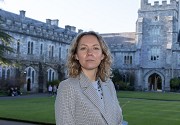

|
Sat6 Apr09:15am(15 mins)
|
Where:
Selwyn Old Library Room 4
Presenter:
|

This presentation provides an insight into everyday life of Evangelical Christians in war-torn Ukraine and their search for answers to questions posed by destructions, violence, and the increasing militarization of Ukrainian society. The study also discusses how Ukrainian Protestant believers revise their historical legacy and memory in the context of war-time disintegration of old (post)Soviet religious networks. The Russia´s aggression against Ukraine since 2014, and particularly its major escalation since February 2022, had an enormous effect on the religious landscape not only in Ukraine, but in what used to be the post-Soviet space. The war ruptured last post-Soviet alliances between churches and congregations, bringing to life new religious identities and triggering new moral challenges.
Most Protestant movements in Ukraine were formed during the Soviet Union, hence, the Soviet legacy shaped the foundation for historical, institutional and identity continuity for many Ukrainian believers and faith communities. Besides, various post-Soviet Eurasian unions within Baptist, Pentecostal or Adventist movements mirrored Soviet – thus Russian-centred – structures. Their war-time disintegration had longstanding consequences as it was Ukraine – “the Bible belt of the Soviet Union” – that traditionally supplied with ministers, pastors, and missionaries the vast (post)Soviet religious networks. Indeed, Ukraine was the heart of Soviet and post-Soviet Evangelical Christianity but, at the same time, never had its distinct ethnically or nationally coloured historical memory. The war urged to often wrenching revise of and search for new historical identities and memory amongst Ukrainian believers.
The Russo-Ukrainian war has questioned other important features of the Ukrainian Protestantism, namely, its conservative, traditionalist, and pacifist stances. The struggle to find their niche as active members of war-torn society, while at the same time rigorously observing their faith-based principles, arouse new societal challenges. As the author’s ethnographic observation of several Protestant communities in war-time Ukraine has shown, believers tend transform these new challenges into a novel peacebuilding approach.